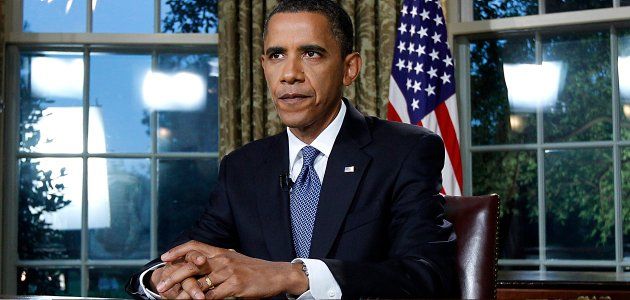
In case you missed it—which is unlikely if you are reading this—President Obama gave an Oval Office speech last Tuesday on the BP disaster in the Gulf of Mexico. Though the remarks were hardly the stuff of legend—Lincoln's ghost need not fear that the Address to the Nation of June 15, 2010, will replace Gettysburg in the American imagination—neither were they as bad as many commentators decided they were.
The reviews from across the spectrum were, to put it kindly, miserable. One expects Sarah Palin, speaking on Fox, to be less than enthusiastic. On Tuesday night, however, even Rachel Maddow of MSNBC, a woman usually disposed to give this White House the benefit of the doubt, was underwhelmed. As she took over the MSNBC coverage from Keith Olbermann, who was also tough on Obama, she simply sighed deeply in disappointment with the president. The next night Maddow had the intellectual integrity to write the speech she wished Obama had given, an exercise that, in my view, elevates her from carper to critic in the best sense of the term. (Disclosure: Maddow and I are friendly and have friends and colleagues in common.) The most productive critics are those who observe the events of the public stage informed by history and ideology and perspective in the hope that one's observations may lead to a better reality for the audience.

Among the disapproving voices, however, Maddow's attempt to show rather than tell in her commentary was the exception that proved the rule. The rule was this: in the view of many, the president failed to give a great or even good speech, seemed unfocused and unspecific, and generally bombed. Still, I was struck by how disproportionate the hostile reaction seemed in relation to the address itself. (And seems still: our colleague George F. Will wallops the president on this subject in our pages this week.) With the perspective of a few days, I think that the reaction to the address tells us more about the observers than the observed, offering us a good example of the prevailing elevation of the stylistic over the substantive—and of the visceral over the reflective—in political conversation.
So it was not a good speech. So what? The next day Obama secured $20 billion in escrow from BP to begin to pay for the damages, and his approach on energy legislation mirrors his approach to health care, which, after being declared dead time and again, actually passed.
There are many reasons to wish for a better response to the oil spill from the president—chiefly that we all wish it had not happened, or that, having happened, it would now stop. I should say that all of us wish that with the possible exception of GOP Rep. Joe Barton, who had to apologize for referring to the escrow as a White House "shakedown" of Big Oil. You can argue, too, that the White House raised expectations by using the Oval Office for the speech, or that Obama waited too long to give a single focused address on the subject. Those arguments, though, are about tactics and stagecraft, which, while crucial, are not the main event. The main event is what the president accomplishes, but that is not as much fun, or as easy, to talk about as a failed speech.
There are a couple of reasons for this lack of proportion, none of which is particularly new, but which bear noting. One is a supply-and-demand problem. Cable television and the Internet create an endless demand for commentary and analysis, but there is a necessarily limited supply of interesting things to say or write. Another is related: because there is so much out there, the instant-analysis genre favors self-assurance and sometimes hyperbole. I know of what I speak: in the magazine and on television and radio, I have occasionally offered quick, ill-formed opinions that I regret. Having the courage to say you do not know the answer to a question is perhaps the beginning of wisdom.
Criticism is a crucial thing (the lifeblood of democracy, the fuel of freedom—choose your noble phrase), but the problem is that there are many more carpers than critics. The fact that anybody can say anything does not mean that anything anybody says is worth hearing. Is this an elitist view? Probably, but I am not arguing for even the remotest limitation on what people can say. The beauty of democracy and the wonder of the digital public square is that more people can express themselves more freely to more eyes and ears than at any other time in history. Such liberation is to be celebrated and honored and defended. With power, though, comes responsibility, for all of us. We can learn, I think, from Maddow—sigh when you think you should sigh, but then have the courage to be constructive.
Uncommon Knowledge
Newsweek is committed to challenging conventional wisdom and finding connections in the search for common ground.
Newsweek is committed to challenging conventional wisdom and finding connections in the search for common ground.





